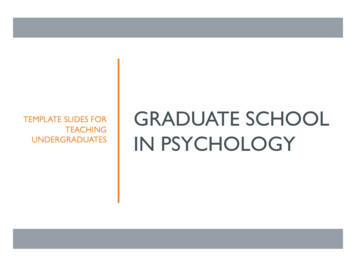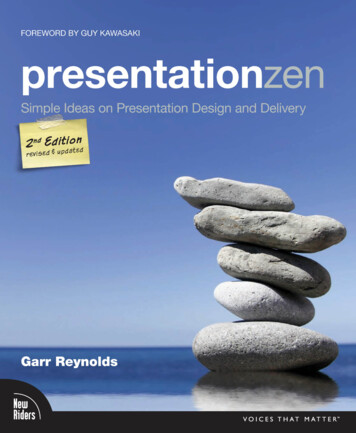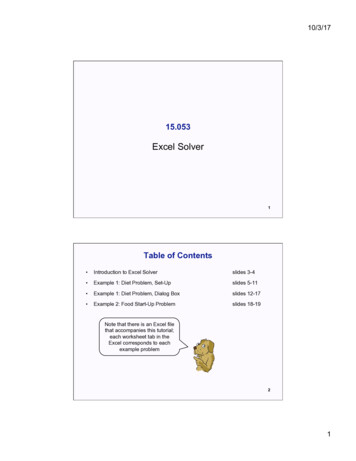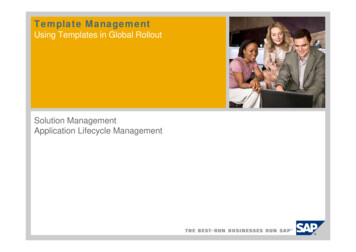
Transcription
TEMPLATE SLIDES FORTEACHINGUNDERGRADUATESGRADUATE SCHOOLIN PSYCHOLOGY
FACULTY: HOW TO USE THIS MATERIAL Consider hosting a workshop at your home institution about graduate programs inPsychology. Many undergraduate students, especially first-generation students, are unaware of the various careers in psychology one can pursue with an advanced degrees.Students are also generally unaware of the different types of graduate programs anddegrees.Finally, many do not know that some programs, like Ph.D. granting programs, are generallyfully-funded.This is a platform to recruit more students to personality psychology! Alternatively, post these slides to your course website. Interested students can view at their leisure.
STUDENTS: HOW TO USE THIS MATERIAL The resources we provide here are focused on graduate school in Psychology withinthe United States. Some information may be applicable to your situation depending on the country youwish to pursue graduate studies in. e.g., programs in Canada may be more like those in the U.S. than to programs in Europe. Use this material as a set of guidelines, rather than a set of hard and fast rules. It’s important to factor in your specific circumstances, identities, and goals whendeciding on if and how to pursue graduate studies. We hope you can use these resources in conversation with your peers, professors,and other mentors!
I WANT TO LEARN MORE ABOUT Why I should consider graduate schoolHow to apply to graduate schoolFinancing my graduate education
WHY GO TO GRADUATESCHOOL?
WHAT CAN IDO WITH ABACKGROUNDINPERSONALITYSCIENCE?Personality psychologists can be found in manyplaces. You can find us. Treating patients with personality disorders.Developing tests to help high schoolstudents identify potential careers.Analyzing data for the US government andthe private sector.Improving people’s experiences with socialmedia.Teaching undergraduate and graduatestudents.
WHY GO TOGRADUATESCHOOL? Training in specific skills Therapy Research design, data analysis Teaching Preparation for licensing exams Necessary for clinical work Networking and professional development Learn more about the career(s) you areinterested in and make contacts with peoplein those careers
SHOULD I APPLY TO GRADUATE PROGRAMS?Consider your career goals.A good career goal describes your values and preferences, not a specific job. “I want to work with children struggling with mental health problems,” not, “Iwant to be a psychologist.”Why? You’ll miss out on lots of jobs that might be a better fit for you.It’s possible you don’t have a great sense of what a specific job entails.
WHAT’S YOUR CAREER GOAL?Therapy, working with clients Consider pursuing degrees in Counseling, School, or Community Psychology, or adegree in Social Work or Education. You’ll most likely want to look for Master’s programs.These degrees vary in cost, but the programs are relatively short (2-3 year). The endof this presentation discusses financing your graduate education. Psychiatrists work at the intersection of medicine and therapy. Mitch Prinstein has some good advice about these routes. This requires a medical degree, meaning medical school.The degree is generally more expensive, and it takes longer to complete, butpsychiatrists also tend to have higher incomes.
WHAT’S YOUR CAREER GOAL?Research, studying people, working with data You’re likely a good fit for a Ph.D., which is a research-oriented degree. Ph.D. programs are generally fully-funded and many come with a (small) stipend, sostudents do not need to take on additional work while pursuing their degree.A few words of caution: Doing research is different from learning. You may enjoy learning but not doingresearch.For those interested in becoming professors, know that the academic job market hasbeen getting worse over recent decades.Not every program or advisor will be equipped to help you get a job outside ofacademiaYou’ll want to narrow down your focus of study before identifying potentialadvisors and programs.
WHAT’S YOUR CAREER GOAL?Being a professor. What draws you to this career? How well do you understand the day-to-day life of your professors? Do you think you would enjoy traveling, grant writing, mentoring, teaching, dataanalysis, editing, public speaking, writing, and administrative work?Are you willing / able to make several moves over your career?What does good work-life balance look like for you? What aspects of scientific study are most interesting to youFor those interested in science, MyIDP can help you clarify your valuesand goals and match you with appropriate jobs.
WHAT IS GRADUATE SCHOOL LIKE?For research-focused programs(Ph.D and some Masters):For clinical-focused programs(Masters and Psy.D.): Training in research and data science Most work is outside the classroom Apprenticeship model Graduate student is more like anentry-level position in a career, ratherthan being a student Coursework is more important Experience gained through internshipsand practicumsThis presentation is mainly focused on researchfocused programs!
APPLYING TOGRADUATE SCHOOLSource:Dr Rodica Damian, University of Houston
2-3 yearsBuild a strong GPAbeforeapplying ( Join a labsophomore Build professional relationships with Professorsyear)1-2 years Gain research experiencebeforeResearch graduate programsapplying ( junior year) Take GRESummerand fall of Ask for letters of recommendation early in the yearapplicationSubmit applicationsseason ( senior year)STARTPLANNINGEARLY
You can continue your F-1status and get one year ofoptional practical training.You can use the practicaltraining either before orafter grad school butchoose wisely.Consult with your international students’ office toget the latest advice because laws change.FORINTERNATIONALSTUDENTSAfter you get accepted to a grad program, contactthe international student office at that school formore information.Most graduate financial aid is unrestricted-international students are eligible.
SELECT PROGRAMS Select schools Department, not university rankings matter Select about 15-20 potential programs based on theirmatch with your academic record, research experience,research interests, and career goals For PhDs, the faculty mentor is one of the mostimportant things to consider. Most departments use an “apprenticeship model”Your mentor will be responsible for most of yourtraining, research productivity, and professionaldevelopment.Good fit (both in terms of research and personality)is essential.
SELECTPROGRAMS:FINDING ANADVISOR ATTHEPROSPECTIVESCHOOL Identify professors who share your researchinterests Check their websites, and look to see if theymention their mentoring philosophies and/orlab values Read journal articles they authored Identify programs where your research interestsare compatible with 2-3 potential mentors, whichwill boost your likelihood of attracting interestfrom at least one of them. Contact potential mentors to verify they areaccepting a new student during the next applicationcycle. Narrow down your list with the goal of applying toaround 8-12 schools. Depending on your resources,you may want to apply to a range of schools (e.g.,less selective highly selective schools).
APPLICATION REQUIREMENTS GPA* GRE Tests** Research ExperienceEven if you do not meet GPArequirements for the program, itis worth reaching out to thepotential advisor to see if this isa hard requirement. CV/ Resume Personal Statement Recommendation Letters The InterviewThe GRE is notalways a requirementfor applications, sobe sure to check thespecific programrequirement.
GPA You will need to send official transcripts to each school you apply to. The better your grades, the better your chances, but exceptions apply, and youdo not need perfect grades. Other aspects of your package may be more important.Optional steps to make your application stellar: Good grades in methods and statistics courses. Expertise in open source statistical programs like R. There are excellent and freeresources online for teaching yourself this program.
GRADUATE RECORD EXAMINATION (GRE)Take the exam thesummer before youapply.Don’t wait until thelast minute. Scorescan take up to 6 weeksto process.Scores are good for5 years. Take it even ifyou’re consideringwaiting a year or two toapply to graduateschool:Keep the price tag inmind:The exam costs 205 totake.Sending official scores toschools often includesadditional fees.Look into the GRE FeeReduction Program forfinancial assistance.Ask potential programs ifthey can accept unofficialscores -- some do and onlyrequire your official scoresif you’ve been accepted tothe program.Don’t forget to prepare.The GRE offers a free practicetest.Test-prep books (see Kaplan andETS) are excellent, range from 30- 60.Look online for free vocabularyflash cards.Some programs also requiresubject GREs.These are additional exams specific tosubject matter, like Psychology. Makesure you know whether yourprogram requires this and factor inthe cost of taking and preparing forthis exam as well.
PRIOR RESEARCH EXPERIENCEIS HIGHLY VALUED Work in the research labs at your university You can contact professors to ask aboutavailable positions. Some spots are paid but most are voluntary orfor course credit. Ask about work-study options. When working in research labs, show initiative,get involved with research projects. You can also work over the summer or workfull-time as a research assistant betweenundergraduate and graduate school. Write a senior honors thesis Check the Psychology department website ofyour university to see the requirements andtimeline.
CV
PERSONAL STATEMENT Read each school’s prompt carefully. Tailor the statement to the program and advisoryou’re applying to. Use a worksheet to prepare your statement. Some examples: UCAS Personal Statement WorksheetAmherst College - Writing Your Personal StatementOld Dominion - Writing an Effective Personal Statement Consider using a book as a guide to crafting the best possible statement. Example: Donald Asher’s Graduate Admissions Essays
If it’s possible, consider how each letter writer canoffer different insights into your abilities, talents, andwho you are as a personRECOMMENDATIONLETTERS You will need at least 3 letters from universityprofessors Select people who know you (ideally you have workedin their research labs/ clinical practice for at least 2months) When to ask The sooner the better Send gentle reminder email to check in 2 weeks beforeeach deadline What to include when asking for a recommendation Prepare a folder of all your info for each writer Resume/CV, Transcript/Courses taken with grades Personal Statement (so they can match their letterwith your interests/goals as much as possible) Spreadsheet of all the schools, deadlines, what toinclude, how to submit (email, online, return tostudent, etc.) Pre-addressed/Stamped envelopes for those thatneed to be snail mailed (hopefully none will beneeded, very rare)
INTERVIEWSIf your written application is successful, youmay be invited to an interview. May be after you’ve received an offer. May be just the next step in the application process.Interviews are always 2-way streets:this is an opportunity for you todecide whether the program is rightfor you.
INTERVIEWS:PUT YOURBEST FOOTFORWARD Pay attention to your body language / eye contact. Every interaction is important! Showing respect towards everyperson you meet can go a long way. Bring questions and always be prepared to ask them, but don’tforget to take turns in any conversation Know the answers to questions about your interests, motivations,goals, abilities and experience Try to know who you will be meeting with ahead of time. Spend some time doing a ‘deep dive’ on the program priorto your interviews.Google interview tips & sample interview questions Dress professionally, but make sure you feel comfortable spendingthe entire day in the outfit you choose Take bathroom breaks when they are offered, even if it’s just tohave some down time to collect your thoughts Be yourself! Being a little nervous is okay and expected. It showsthat you’re excited about the possibility of attending the program.
Learn everything you can about the success and wellbeing of current students. INTERVIEWS:USE THEOPPORTUNITYTO LEARNMORE Ask current students what they like and dislike,what issues have come up in the past, how thoseissues have been resolved. How long do students typically spend in theprogram? Are students successful at finding jobsafter graduation? In what kinds of careers? What opportunities for training or developmentare unique to this program?Keep your well-being in mind. Will you be comfortable living in this city for 2-6years? Will you feel safe? It’s ok to consider constraints on location,especially if you’re responsible for other people.
ACCEPTANCEIf you are accepted: How long do I have to decide? Standard deadline: April 15 Notify programs where you interviewed of offers from other programs. Do not feel pressured to accept an offer early if you may have other options; do not acceptany offer immediately. But be courteous once you know your decision, let programs know so they can reach outto their waitlist.If you are not accepted: Reassess Were you a good fit for these programs? If no, why not? Consider reaching out to interviewers for feedback. Gain more research experience; consider a Master’s degree.
FINANCING YOURGRADUATE EDUCATIONSource: Dr Christiane Spitzmueller,University of Houston
PhD programs tend to be 100% funded But salaries (called stipends) and otherbenefits (e.g., healthcare) vary acrossschoolsBASICS MA programs tend to be unfunded--you have tofund yourself But there are some exceptions, e.g., Collegeof William and Mary, Wake Forest, Villanova And see following slides for ways to fundyourself Look carefully at each school’s website
LOANS Federal Graduate can help cover the cost of higher education. Two types of federalloans (along with private loan options) Direct Unsubsidized Loan Graduate students are NOT eligible for subsidized loan (US Dept. of Education pays interestwhile you are in school at least half time).No need to demonstrate financial needInterest will accrue (Fixed rate is 6.6%)Limit on annual and cumulative loan amountDirect PLUS Loans Loans to eligible graduate students through schools participating in the Direct Loan ProgramMust not have an adverse credit historyA parent can cosign for the loanFixed interest rate is 7.6%You can borrow up to cost of attendance Private loans through lending institutions (e.g., banks and credit al-assistance/
LOAN REPAYMENT OPTIONS Psychologists can earn loan forgiveness (for Direct Loans only) under the followingqualifications: You are required to make 120 payments, which must be on time, according to the schedule set out in your Direct Loans.You must make those payments under a repayment plan that qualifies for student loanforgiveness.You must work full-time at a qualifying public service institution at the time that you makeall your payments National Health Service Corps Loan repayment Plan Administered by the Bureau of Health Workforce (BHW) in the Health Resources andServices Administration (HRSA) of the U.S. Dept. of Health and Human Services (HHS) Serve two full years at a qualifying practice, in which case the NHSC will pay up to 50,000toward your student loans, or Serve two half-time years at a qualifying practice, in which case the NHSC will pay up to 25,000 toward your student /financial-assistance/
SCHOLARSHIPS Numerous scholarships you can apply for that offerClick here to learn moreabout scholarships for: Scholarships through Psi Chi Underrepresentedminorities Women LGBTQ persons Veteransfinancial support that do not need to be paid back Allyn and Bacon Award for empirical research paper(Prizes of 1,000, 650, and 350) Diversity Article awards on topics of diversity issues(Four awards of 300) Irwin L. Goldstein Scholarship and the BenjaminSchneider Scholarship For minority doctoral student in I-O psychology APF Graduate Student Scholarships General scholarship for graduate students inpsychology George C. Thornton, III Graduate Scholarship Supports doctoral student in I/O psychology Scott and Paul Pearsall Grant Supports graduate students who seek to increaseunderstanding of psychological pain and stigmaexperience by adults with visible physical disabilities
¡ National Programs That Offer GRE Fee Reductions and GradPREAPPLICATION:PROGRAMSTHAT OFFERFINANCIALSUPPORTProgram Assistance:¡ Gates Millennium Scholars Program¡ Gates Millennium Scholars program: Founded by BillGates foundation¡ Scholarship program for incoming freshman students ofcolor entering college, however, if you are one of theserecipients and continue onto grad school, you areeligible for a GRE fee reduction and Gates MillenniumFellowship in a graduate degree program¡ Veteran’s Affairs¡ For past and present Servicemembers, and theirfamilies
¡ Timing of first payment?¡ Some institutions may not pay you until you havebeen in school for 1-2 months.¡ Health insurance¡ Some institutions may allow you to choose aspecial faculty insurance or may offer specialgraduate insurance rates.I HAVE OFFERS!WHATSHOULD ICONSIDER,FINANCIALLY?¡ Plan on getting a Master’s degree first?¡ Some students decide this is a great option toboost their CV and experience.¡ Ask potential PhD and PsyD programs if they willhonor courses taken elsewhere.¡ Some institutions will allow undergraduates to takegraduate level courses prior to enrolling in the MAprogram.¡ Can I work while enrolled?¡ Most PhD and PsyD programs disallow workingduring enrollment due to the workload.¡ Some Master’s programs may be ok with this, butcareful consideration of your personal timeline,finances, and workload must inform this decision.
Thank you to Drs. CandiceAlfano, Rodica Damian, andChristiane Spitzmueller forallowing us to adapt their slides.These slides were created,edited, and formatted by Drs.Robert Latzman, Chris Martin,Nicole Lawless DesJardins, SaraWeston, and Joanne Chung.THANK YOU FORWATCHING/READING!
¡ The National Association of School Psychologists – Education and ResearchTrust¡ American Association of University Women International Fellowships¡ For women who are not US citizens or permanent residents¡ APA Mental Health and Substance Abuse Services Fellowship¡ For those pursuing doctoral degrees in various mental health servicesSCHOLARSHIPS FORUNDERREPRESENTEDMINORITIESareas to promote culturally competent mental health and substanceabuse services¡ Filipino-American Psychology Scholarship¡ To increase the number of Filipino-American professors, researchers,and academics in the field of psychology¡ Mental Health Dissertation Research Grant to Increase Diversity¡ qualified doctoral candidates from underrepresented groups, withdisabilities or from disadvantaged backgrounds¡ Zeta Phi Beta Sorority General Graduate Fellowships¡ For African-American graduate women who are working onprofessional degrees, master's degrees, doctoral, or post-doctoralstudies.
¡ Carol Williams-Nickelson Award for Women’s Leadership¡ For women currently pursuing a doctorate in psychology withresearch focused on women’s issues¡ Career Advancement Scholarship¡ Variable scholarship awarded to undergraduate women currentlystudying psychology¡ Nancy B. Forest and L. Michael Honaker Master’s Grant for Research inPsychologySCHOLARSHIPSFOR WOMEN¡ Open to women conducting Master’s thesis research inpsychology¡ Woodrow Wilson Dissertation Fellowship in Women’s Studies¡ Pioneer Graduate Student Award¡ For Asian Pacific femin
WHAT’S YOUR CAREER GOAL? Therapy, working with clients Consider pursuing degrees in Counseling, School, or Community Psychology, or a degree in Social Work or Education. You’ll most likely want to look for Master’s programs. Thesedegrees vary in cost, but the programs are relatively short (2-3 year).The end of this presentation discusses financing your graduate education.










